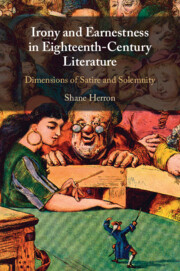16 results
Abbreviations
-
- Book:
- Irony and Earnestness in Eighteenth-Century Literature
- Published online:
- 19 January 2022
- Print publication:
- 27 January 2022, pp x-x
-
- Chapter
- Export citation
Chapter 2 - “By One of the Fair Sex”
-
- Book:
- Irony and Earnestness in Eighteenth-Century Literature
- Published online:
- 19 January 2022
- Print publication:
- 27 January 2022, pp 54-84
-
- Chapter
- Export citation
Chapter 5 - Gratitude for the Ordinary
-
- Book:
- Irony and Earnestness in Eighteenth-Century Literature
- Published online:
- 19 January 2022
- Print publication:
- 27 January 2022, pp 146-183
-
- Chapter
- Export citation
Index
-
- Book:
- Irony and Earnestness in Eighteenth-Century Literature
- Published online:
- 19 January 2022
- Print publication:
- 27 January 2022, pp 235-238
-
- Chapter
- Export citation
Notes
-
- Book:
- Irony and Earnestness in Eighteenth-Century Literature
- Published online:
- 19 January 2022
- Print publication:
- 27 January 2022, pp 190-218
-
- Chapter
- Export citation
Introduction - On Ludicrous Solemnity
-
- Book:
- Irony and Earnestness in Eighteenth-Century Literature
- Published online:
- 19 January 2022
- Print publication:
- 27 January 2022, pp 1-17
-
- Chapter
- Export citation
Contents
-
- Book:
- Irony and Earnestness in Eighteenth-Century Literature
- Published online:
- 19 January 2022
- Print publication:
- 27 January 2022, pp vii-vii
-
- Chapter
- Export citation
Chapter 1 - Swift and the Hacks
-
- Book:
- Irony and Earnestness in Eighteenth-Century Literature
- Published online:
- 19 January 2022
- Print publication:
- 27 January 2022, pp 18-53
-
- Chapter
- Export citation
Bibliography
-
- Book:
- Irony and Earnestness in Eighteenth-Century Literature
- Published online:
- 19 January 2022
- Print publication:
- 27 January 2022, pp 219-234
-
- Chapter
- Export citation
Acknowledgments
-
- Book:
- Irony and Earnestness in Eighteenth-Century Literature
- Published online:
- 19 January 2022
- Print publication:
- 27 January 2022, pp viii-ix
-
- Chapter
- Export citation
Epilogue - Earnest Satire, Cynical Credulity, and the Task of Irony
-
- Book:
- Irony and Earnestness in Eighteenth-Century Literature
- Published online:
- 19 January 2022
- Print publication:
- 27 January 2022, pp 184-189
-
- Chapter
- Export citation
Chapter 4 - Dark Humor and Moral Sense Theory
-
- Book:
- Irony and Earnestness in Eighteenth-Century Literature
- Published online:
- 19 January 2022
- Print publication:
- 27 January 2022, pp 109-145
-
- Chapter
- Export citation
Chapter 3 - Keeping Up Appearances
-
- Book:
- Irony and Earnestness in Eighteenth-Century Literature
- Published online:
- 19 January 2022
- Print publication:
- 27 January 2022, pp 85-108
-
- Chapter
- Export citation
Copyright page
-
- Book:
- Irony and Earnestness in Eighteenth-Century Literature
- Published online:
- 19 January 2022
- Print publication:
- 27 January 2022, pp iv-iv
-
- Chapter
- Export citation
Dedication
-
- Book:
- Irony and Earnestness in Eighteenth-Century Literature
- Published online:
- 19 January 2022
- Print publication:
- 27 January 2022, pp v-vi
-
- Chapter
- Export citation

Irony and Earnestness in Eighteenth-Century Literature
- Dimensions of Satire and Solemnity
-
- Published online:
- 19 January 2022
- Print publication:
- 27 January 2022



